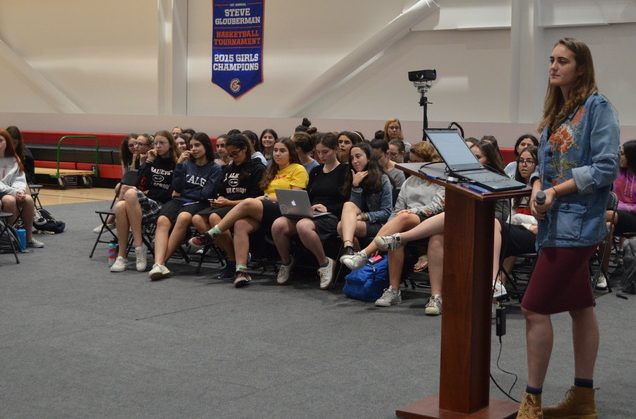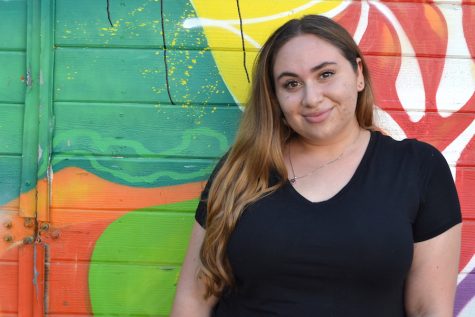If it hurts, is it harassment? And who should report it?
Town Hall explores the question in wake of Harvey Weinstein scandal
SPLIT: Senior Rosie Wolkind led the girls’ portion of Town Hall Oct. 19. Students were divided by gender for the first half of the meeting
November 6, 2017
After a week of graphic revelations about Harvey Weinstein’s assaults on female actresses, Shalhevet students butted heads at Town Hall Oct. 19 about sexual harassment in the workplace, where the burden falls to report such acts, and what defines sexual harassment overall.
The first part of Town Hall was divided by gender, with girls in the gym and boys in the large Beit Midrash on the third floor. Then for the final 25 minutes, two genders convened and the conversation rapidly fired up.
Among the girls, students wondered why victims are sometimes blamed not only for what happened to them, but for not having reported it, and why employees who knew what was happening and what Mr. Weinstein was doing have not been blamed.
Senior Rosie Wolkind led that discussion, starting out by noting that the behavior had been an “open secret” in Hollywood for many years, meaning that most people in the industry knew about it yet no one would say it publicly. Rosie asked where the responsibility to speak out should be placed.
One of the discussion questions that the Agenda Committee had set up was what the implications of “whisper culture” are. Students said whisper culture was more like gossip, and might feel like speaking out or reporting abuse but didn’t have the same effect.
“Whisper culture isn’t just victims whispering to each other about it,” said senior Maia Zelkha. “It’s people who are in the same positions of power, and even higher power, knowing, but not saying anything.”
“I’m just wondering why it’s felt that the burden of being sexually assaulted falls on the victim for them to speak out,” Maia said, noting that many in Hollywood had been silent for decades.
Meanwhile, the boys talked about what exactly sexual harassment is. Some wondered whether the problem was being blown out of proportion.
“Can we go back to the ‘honey’ word… I don’t see the connection there,” said one male student in the boys’ Town Hall. “If anything it would be a complement.”
But freshman Rami Fink thought otherwise.
“I think that whatever makes people feel uncomfortable about who they are, and what sex they are, what sexuality they are, what race they are, that’s a problem,” said Rami. “You can call it sexual harassment, but whatever it is, it’s a problem.”
The boys were shown a statistic they were told was from the Washington Post, stating that around 33 million women had been sexually harassed, while 13 million women had experienced sexual abuse in work-related scenarios.
Those numbers were actually from an ABC News-Washington Post poll conducted earlier that week, which did not define either the terms harassment or the term abuse.
The students then all gathered together in the gym and discussed what took place in their separate Town Halls. Sophomore Noah Hertzberg asked what was being measured in the ABC News-Washington Post poll.
“Thirty-three million women in the U.S. have been sexually harassed — I said, ‘Okay so is that verbal harassment or is that actual physical harassment?’” said Noah, describing what he’d asked upstairs. “And then that brought on the topic of okay, well if you call someone honey, that is harassment. Then I’m like okay, well, how is that harassment? How does that make any sense?”
He said if the definition of harassment included calling someone “honey,” then the problem was not as bad as the boys were being told.
“Let’s say 10 million women were harassed physically,” Noah said. “If you called 23 million honey, that just inflated the number to 33 million. You don’t have as big of a problem as we make it seem.”
That led to a comment by Judaic Studies teacher Rabba Ramie Smith, who described something she’d found hurtful while a high school student at Salanter-Akiva-Riverdale (SAR) Academy in New York. She said if she had to go to the boys’ side of the mechitzah, she would be teased.
“Almost every single time a girl walked on the boy side of the mechitza, they would be yelled at,” said Rabba Smith. “I was made to feel very, very, tiny, like I didn’t belong, like this wasn’t my space, by men around me, simply because I was a girl. It wasn’t so overt, it wasn’t so outright, but that is definitely sexual harassment. It’s not about what is being said — it is about how it makes people feel.”
Sophomore Joseph Klores responded.
“This was not sexual harassment because the rules are men on one side, women on the other,” said Joseph. “They weren’t yelling at her simply because she was a girl, they were yelling at her simply because she wasn’t following the clearly known rules. It would have been the same situation if a man went on the women’s side.”
English teacher Ms. Crincoli disagreed, saying later that she wanted to speak up for girls who statistics show are harrassed in schools.
“I felt that I needed to say something so that those girls, and especially girls who statistics show have been harassed, or abused, sexually, don’t feel like their burden is on them, because it’s not,” said Ms. Crincoli. “If we are trying to be anything, we are trying to be good people. We need to make sure that we understand that we have a moral responsibility to our fellow human beings.”
Freshman Rami Fink commented on how he felt the boy’s discussion went.
“I kind of felt like they were denying that there was actually a problem,” said freshman Rami Fink, talking about the boys Town Hall. “People were getting very defensive and making it sound like there wasn’t very much of a problem, when in fact there is a really big problem.”
“It doesn’t really matter what people actually say, how they act and what we call it,” said Rami, after Town Hall. “It’s just there are people that feel a certain way and we are making them feel that way and we have to fix that.”














